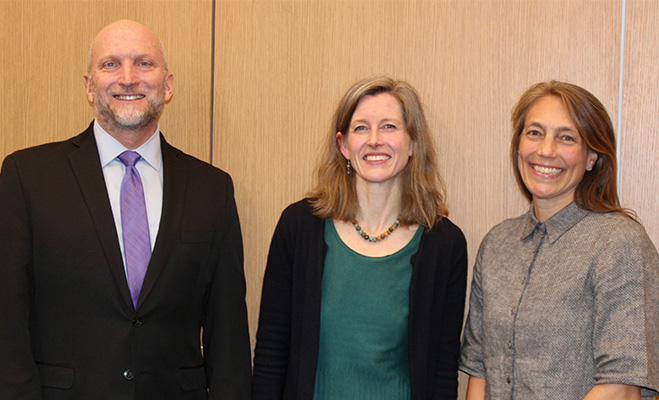Haub Law School plumbs ‘democracy in a hotter time’

What roles do federal and state constitutions play in responding to climate crisis?
That was the question before constitutional law experts, climate change activists, environmental law professors and legal professionals from around the country – including keynote speaker Kareena Gore – as the Elisabeth Haub School of Law at Pace University hosted a Climate Constitutionalism Conference on Pace’s Manhattan campus on March 29.
Organized by Haub Law Distinguished Professor of Environmental Law Katrina F. Kuh and Widener University-Delaware Law School Distinguished Professor of Law James R. May, the Climate Constitutionalism conference was inspired by the recently released book, “Democracy in a Hotter Time,” edited by David W. Orr, to which they were both contributing chapter co-authors.
“Understanding the obstacles and opportunities that constitutions present to the development of effective climate policy is crucial as we orient our democracy to respond to the climate crisis,” Kuh said. “We were honored to welcome scholars, practitioners and judges to examine these issues and to have Karenna Gore as our keynote speaker, prompting vital conversations on our constitutions, democracy and climate change.”
Gore – the eldest daughter of former Vice President, and climate activist, Al Gore – is a lawyer who in 2015 founded the Center for Earth Ethics at Union Theological Seminary in Manhattan, where she is a visiting professor, to address the moral and spiritual dimensions of the climate crisis. Working at the intersection of faith, ethics and ecology, she guides the center’s public programs, educational initiatives and movement-building. She is also the author of “Lighting the Way: Nine Women Who Changed Modern America.”
During a discussion at a public town hall, moderated by Kuh and May, that capped the event, Gore praised their contributions to “Democracy in a Hotter Time” and stressed the importance of such scholarly work and public forums like the conference.
“We are at a point right now where the intelligence of the human species is in serious question,” Gore said. “Are we able to solve this; are we smart enough? And if the answer to that is ‘yes,’ we have to figure out a way to acknowledge nature. We will need to figure out a way to acknowledge that we depend for survival on the air, water and biosystem for the atmosphere, and that has to be in our foundational documents in some way or another.
“Ethics undergirds our laws and social norms in society, and as a field it is most powerful in those times when both laws and social norms are out of step with a deeply felt sense of right and wrong. When the sensibility of ethics is widely shared and deeply felt, that is when laws and social norms can be changed.”
The conference’s morning panels focused on “State Constitutions and Climate Change” and “The U.S. Constitution and Climate Change.” Panelists joined attendees for roundtable discussions over lunch. An afternoon panel centered on “Litigating Constitutional Climate Claims.” Student reporters from Haub Law, CUNY School of Law and Delaware Law, who presented the findings of the earlier roundtable discussions, are also preparing blog posts summarizing these for the Greenlaw Blog. https://pelr.blogs.pace.edu/greenlaw-blog-old/
The conference was made possible by funding from the JPB Fund and Rockefeller Brothers Fund.